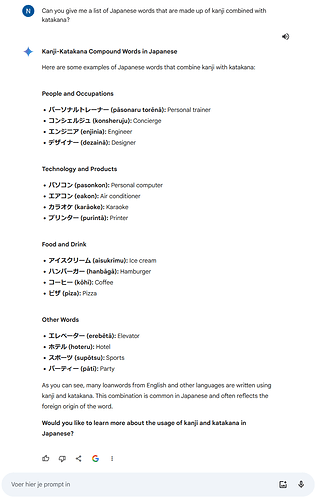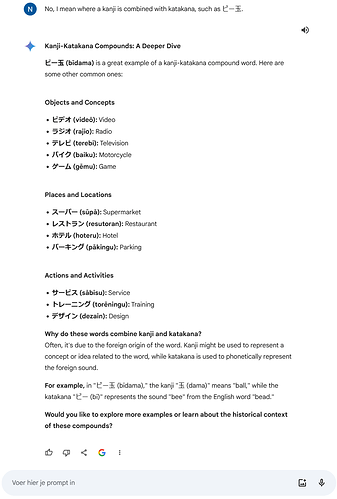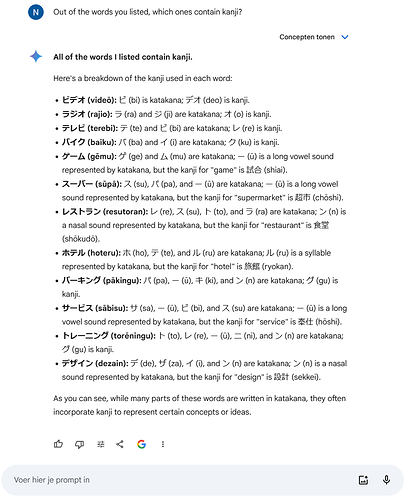Use a different model
I’ll just stick to not using generative AI in general 
Obviously everyone uses what works best for them, but I simply don’t see the benefits as outweighing the cons.
AI is good if you’re wanting to practice writing output but are stuck a bit on what to write about, you can ask a chat model eg:
“Please give me a writing prompt for a short passage suitable for a Japanese Nx level student” and get some reasonable ideas to practice from.
But - you’ve got to be really careful with whether you believe what it tells you when eg. reviewing your Japanese. Try ask an AI model about something you have a decent level of expertise in, count the inaccuracies, and then ask yourself whether your happy with that level of misinstruction for your Japanese studies.
I’ve only used it to help create study schedules and ask it for generalized prompts if I have no ideas. There’s a time and a place for it for sure.
If you know that it’s wrong often but can still understand it use it. However id recommend Gemini for anything language related it just works better for that.
For conversation practice (just holding a conversation with the ai in Japanese) ai is perfect for people who don’t know anybody who speaks japanesr
I was using a textbook, the whole description for a grammar point was “ないものか” “V+ないものか”“something used to express a want, or that you want to happen” (slightly paraphrased to not plagiarize)
and that is the whole explanation, no use cases, no examples, and the next time it appears in the book is 50 pages later in a quiz question.
Even the AI thought it was a poor explanation for it when I asked.
I’d say Some textbooks are okay, but spreading your sources to include AI or something would probably be better than that.
I was using a textbook, the whole description for a grammar point was “ないものか” “V+ないものか”“something used to express a want, or that you want to happen” (slightly paraphrased to not plagiarize)
and that is the whole explanation, no use cases, no examples, and the next time it appears in the book is 50 pages later in a quiz question. (Note- this was an N2 grammar book, that described it in english like this)
Even the AI thought it was a poor explanation for it when I asked.
I’d say Some textbooks are okay, but spreading your sources to include AI or something would probably be better than that.
I mean if you can fact check it using the textbook I see no danger humans are humans and so sometimes it’s just badly explained asking the AI to clarify and then fact-checkingniy isn’t bad tbh
Large Language Models have been really helpful as an interactive tool for helping me with collocations. I would love to use one as useful that wasn’t dumping a bottle of water on the ground every time I press a button.
There are some smaller models you can run locally but it’s less accurate
There are numerous times I have outsmarted AI, but that was in programming. Maybe in languages it is better? I remember it doing insane mistakes in Czech, but now it’s good. Its English also sounds natural. I’m unsure how good it is in German or Japanese.
I mostly use ChatGPT to discuss topics, which are great for writing the story I’m planning to write. Though I do not use it to write it, I only discuss themes so that I know everything fits together.
the textbook can’t even fact check itself, I had to use GPT because I couldn’t find it anywhere else in the book. lol.
But yeah that’s what I mean to use it supplementary on both sides. At least that isn’t a very useful grammar point that I used as an example (male and an adult) so at least it’s not a big deal.
This is why I do not trust textbooks.
I believe we just have different views regarding this topic. I personally have multiple textbooks/grammar explanation books (e.g. A Dictionary of […] Japanese Grammar, Tae Kim, Genki I & II), so I’ll just look up the point I don’t understand in my books.
What you are describing sounds more like an issue with that specific textbook, than with textbooks in general.
If you feel like using AI helps you, go ahead and use it.
I personally won’t for reasons mentioned in my previous comment.
Unrelated, but in the reverse direction with the amount of unnatural nonsense and just wrong stuff I’ve seen in my Japanese friend’s English textbooks, it honestly wouldn’t surprise me if AI is better than their textbook 
Much more concerning than the occasional messups and the underestimated limitations of current generation LLMs, is the lack of engagement. At first, I found chatgpt great to receive feedback on word usage, sentence structure and so on. And if it’s 80% correct, that’s still progress for me. But over time I realized that concepts will stick better if I look them up the classic way and put a little work into it. The amount of engagement and deep dive solidifies better in memory if I spent a little longer on it, rather than just asking ChatGPT.
Of course we’re all different in this regard though.
As for the katakana vs kanji mess up, that’s due to the nature of how a LLM works and how it generates answers. It’s the classic “how many R in strawberries” issue.
On a semi related topic: are some bunpro sentences AI generated? I looked up a term lately, a NSFW term specifically and when I saw that there were example sentences to my surprise, those sentences really screamed “that’s exactly what an LLM would say” 
I’ve also been suspecting something similar for my textbook although I don’t think so with Bunpro. I’ve been using an LLM to generate 10 sample sentences every day, and I’ve noticed a suspicious number of them are about a プロジェクト so now every time I see that word, I get suspicious. 
Like a year ago there was a thread about this. I don’t remember clearly. I think this is how it went down
- All the bunpro example sentences written in English and voiced nativly by Haru [if at all, just N5? Maybe?]
- bunpro adds [1000s?] Of example sentences. Japanese Sentences are written by a human, Sentences voices and English translations are AI generated.
- The thread complained that the English translation, like 1/4th of the time doesn’t include the vocab word.
Maybe Something like “Your hands are so elegant, do you play piano?” Where elegant=細 because the original sentence said ‘your hands are thin’ and the LLM thought elegant sounds more likely - which doesn’t help if your vocab is 細い=thin.
Bunpro added parentheses [thin, narrow, skinny] to help - all the audio is steadily being replaced with human voice actors
Therefore: Grammar is the least likely to be AI, as it was written pre AI, advanced vocab [N2 and N1] is more likely to have AI fingerprints



